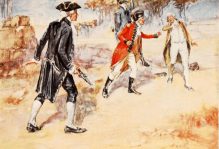Battle of Plassey: God Fought for Great Britain
┬Ā
EditorŌĆÖs Note : Battle of Plassey paved the way for British entry into India. The erstwhile traders who have been trying to find a political toe hold in the country, found an opportunity when they defeated a vastly superior army of Siraj ud Daulah, the Nawab of Bengal at the battle at Plassey near Murshidabad. Almost everything went wrong on that fateful day of 23 June 1757 for Siraj- ud- Daulah. While the defeat of Siraj ud DaulahŌĆÖs forces is generally attributed to treachery of ┬ĀMir Jafar, there was something more important which lead to the defeat. Siraj Ud Daulah had amassed a army of 50,000 solders against the British forces numbering 3000. If we take into account the 16000 troops under Mir JafarŌĆÖs command which did not join the fight, still Siraj ud Daulah had an effective fighting strength of ┬Ā34000 men and cavalry which far surpassed the British numerical strength at Plassey. Siraj had under his command 57 pieces of heavy field artillery manned by highly trained French troops. In comparison British had 10 artillery pieces. Still Siraj lost, ┬Āpaving the way for nemesis of Bengal and India. ┬ĀThe write-up recounts the trail of events which lead to this disastrous loss. Research inputs for this article were provided by Ms Mousumee Biswas. She did the primary research at Murshidabad, the erstwhile capital of Siraj-ud-Daulah. Mousumee is an Urban Planning Consultant and resides in Salt Lake, Kolkata.┬Ā
There is a famous English adage ŌĆ£Keep your (Gun) powder dryŌĆØ, and there could be no better example of this than at the Battle of Plassey. The emperor of Bengal Siraj-ud-Daulah learnt it the hard way when he met the British, lead by Robert Clive, in the battle field at Plassey at the outskirts of Murshidabad town in Bengal on 23 June 1757. The NawabŌĆÖs numerically and technologically superior troops were decisively defeated not because of any extraordinary valour by the British troops, but because it had rained heavily on that day and Siraj -ud-DaulahŌĆÖs army had nothing to protect the gunpowder from getting drenched. The Biritsh had the foresight to bring along tarpaulin sheets to drape on their ammunition and guns to prevent them from getting wet. As if this misfortune was not enough, a large section of SirajŌĆÖs troop lead by Mir Jaffar defected to the British side. Siraj- ud- Daulah had lost the battle even before the first bullet was effectively fired.
Battle of Plassey was not another of the multitude battles fought in the Indian sub continent. This battle opened the gates of India to the British and from being traders they became rulers. Tragically though if one were to write a book on Sirajud-DaulahŌĆÖs military strategy at Plassey it would be titled ŌĆ£What not to do at the battlefieldŌĆØ. About 500 years ago, at the first battle of Panipat, BabarŌĆÖs cannons had disseminated Ibrahim LodhiŌĆÖs army and Mughals came to power in India. Ironically exactly 181 years later, SirajŌĆōud-DaulahŌĆÖs canons refused to fire, which brought in the British as political masters of India.
The British had tried long and hard to find a foot hold in India. English could not make any headway, as Portuguese were sitting pretty in India. They were close to the Mughals and had virtual monopoly on Indian trade. It was only in 1612 that Captain Thomas Best as commander of the 9th British expedition to India reached Surat, the Mughal Trading port in 1612 and achieved a daring naval victory over the Portuguese at the Battle of Swally (15 kms from Surat) . The Mughal Governor allowed British to set up a trading post at Swally. Mughals saw in British a partner to offset the Portuguese influence and monopoly. The bargain however went terribly wrong as later events would unfold. What started with the Battle of Swally in 1612 was completed with the Battle of Plassey in 1757. The traders after Swally became the rulers after Plassey. It had taken British a long 144 years to achieve this. Many events happened in the intervening period, too numerous to be related to here. LetŌĆÖs concentrate on what happened at Plassey.
The run-up to the Battle of Plassey and its eventual fate is attributable to factors which started much before the first cannon boomed at the mango grove on June 1757 at Plassey. Siraj-ud-Daulah assumed the throne of Bengal from his grandfather Alivardi Khan in 1756 at the age of 23. Statecraft is about juggling with compromises and walking the tightrope. However for a young man suddenly elevated as the king, a few hasty decisions are expected, and Siraj was no exception. He started to purge the system and put in place men he trusted, and naturally he earned a number of enemies, who ultimately would prove to be SirajŌĆÖs nemesis. His haughty demeanour and his glad eye for the woman of aristocratic families added to his enemies, who waited for an opportune time to strike back.
That opportunity presented itself when the battle of Plassey happened. Notwithstanding shades of grey in SirajŌĆÖs personality, he has to be given the credit of having foreseen the expansionist intent of the British. When the British started expanding their fortification at Fort William in Calcutta, Siraj objected saying that British were mere traders and had no sovereign rights and that all political powers rested with the Nawab of Bengal. SirajŌĆÖs warning went unheeded by the 34 year old Richard Drake, the then British Commander of Fort. William at Calcutta. In retaliation Siraj attacked Calcutta with a 50,000 strong army. DrakeŌĆśs arrogance was not backed with military might, the fort was overrun by Raja Durlabh, SirajŌĆÖs General on 20 June 1756. Calcutta was renamed Alinagar. This was the first time Indians had captured a British fortification.
However the victory was marred by the infamous Black Hole of Calcutta incident, which many historians believe lead to the Plassey battle. SirajŌĆÖs Army had captured 146 prisoners of war at Fort William and confined them in a small guard room overnight. In the morning it was found that 123 prisoners had died due to suffocation. There are however reports that the figures are exaggerated, but there is a consensus that the event happened. In all probability Siraj was not culpable for this incident, the lower officials of his army were┬Āto be blamed. But whatever the cause, the incident raised a furore in Britain. In an unprecedented move, Britain requisitioned all its resources in India, to launch an attack on Siraj ud Daulah. It is possible that had Black Hole incident not happened, the British reaction might have been more cautious and circumspect. The military action over diplomatic means was fuelled with revenge.
British moved in troops and ships to Calcutta from its fortification at Fort St George in Madras. The mobilisation was under the
command of their best military commander Robert Clive. As a dismal lesson in military strategy, Siraj had lightly garrisoned Calcutta,
and Clive with comparative ease recaptured Calcutta. The quick and severity of British response unnerved Siraj, who surrendered,
and promised to compensate the British. Siraj lost his opportunity at Calcutta to stem the British tide. The outcome at Plassey was mirrored in SirajŌĆÖs meek capitulation at Calcutta.
Robert Clive (1725-1774), winner at Plassey. His statue can be seen opposite India House in London. He committed suicide at the age of forty Nine. Artist : Nathaniel Dance
Emboldened British pursued for political ascendancy. Robert Clive attacked the French Colony at Chandranagore, near Calcutta. Siraj sided with the French, which brought him again in direct conflict with the British and gave an excuse to the British to press for SirajŌĆÖs removal. The moment of truth was fast approaching when on 21 June 1957 Clive arrived at Plassey, located on the┬Āoutskirts of Siraj-ud-DaulahŌĆÖs capital at Murshidabad, with an army of 1,100 Europeans and 2,100 Indian sepoys and nine field cannons. Siraj lined up an impressive army with 18,000 cavalry, 35,000 infantry and 53 pieces of heavy ordinance. He also had amongst his ranks French artillerymen lead by St. Frais.
For once in his career Clive hesitated, and called a council of sixteen officers to decide, as he put it, ŌĆ£whether in our present situation, without assistance, and on our own bottom, it would be prudent to attack the Nawab, or whether we should wait till joined by some country (Indian) power.ŌĆØ Clive himself headed the nine who voted for delay; Major Eyre Coote led the seven who counselled immediate attack.
While Siraj ud Daulah had military superiority in terms of soldiers and military hardware, what was lacking was foresight, military logistics, leadership and strategy
Battle of Plassey almost would not have happened but for the receipt of a letter from Mir Jafar one of the Commander of SirajŌĆÖs┬Āarmy, who offered to betray his king in lieu of being made the Nawab of Bengal. Siraj have never trusted Mir Jaffer, and had even demoted him from the post of the paymaster of the army. However it is a comment on SirajŌĆÖs inexperience that he left the command of 16000 of his troops under Mir Jaffer. The same 16000 troops were to desert the battlefield.
On 23 June around 8 am the French artillery opened fire, followed by SirajŌĆÖs cannons. The British responded with their own field guns. In first half an hour the English casualties were heavy, ten European and twenty Indian sepoys from CliveŌĆÖs unit lay dead. The British infantry retreated into their entrenchment. The first round of the battle had gone to Siraj.
The artillery exchange continued for several hours, it was anybodyŌĆÖs battle. Suddenly a heavy downpour started which drenched most of the SirajŌĆÖs gunpowder. As a bad lesson in military logistics, SirajŌĆÖs army had forgotten to bring in tarpaulin sheets to keep the guns and powder dry. Resultantly the Indian artillery now became sporadic. However the British continued as before, their powder and ammunition having been covered with tarpaulins was usable. Siraj was now a worried man, his artillery was dysfunctional.
Siraj Ud Daulah (1733-57), the Nawab of Bengal, whose loss at Plassey opened the doors of India to the British
Mir Mardan the most trusted of SirajŌĆÖs┬ĀGenerals lead a cavalry charge to overrun the British position. This proved suicidal, the British field guns stemmed the attack and Mir Mardan was killed. The battle had now decisively tilted towards the British. Unlike Clive, ┬ĀSiraj was not leading from the front, and preferred to sit in his camp hoping for an easy victory. On hearing the death of Mir Mardan, Siraj panicked. He ordered his troops to withdraw behind a protective embankment and he himself left the battle field for his capital at Murshidabad 48 kms away, leaving the battle to his generals. Seeing their king leave the battlefield, the morale of the troops plummeted.
It was now 2 PM, the French artillery of 4 guns kept up the fire. As predetermined, Mir Jafar betrayed Siraj and his 16000 men moved away from the battlefield. The French, who were putting up a brave resistance, had banked on Mir JafarŌĆÖs men for support, were now stranded and got over powered by the British. Of all the SirajŌĆÖs troops, the French were last to retreat from the battlefield. British finished off the battle with cannon fire at SirajŌĆÖs camped troops. By 4.30 PM British victory was complete. The total losses suffered by British were 22 killed and 50 wounded. Siraj lost about 500 men.
Mir Jafar was made the Nawab, a reward for his treachery. Siraj ud Daulah fled from Murshidabad. Enroute on his way to Patna, he took refuge for the night at a deserted garden at Rajmahal where he was detected and eventually murdered on orders of Mir JafferŌĆÖs son Miran. Ironically untimely death awaited the victor of Plassey as well; Robert Clive committed suicide 16 years later in 1774 at the age of 49 in London, due to long term depression and debilitating disease. And as for Mir Jafar, history has not forgiven him for his treachery. Till date the palace of Mir Jafar in Murshidabad is known as Namak Haram Deorhi (TraitorŌĆÖs Gate).
None of the sides came out with any glory from the battle. British won through treachery, while Siraj made elementary mistakes in military strategy. And God was not on Indian side for sending in untimely rain that afternoon.






Bear in mind that 18th century Indian military organization and technology were severely lagging behind contemporary Northwestern and Central European standards. Before they realized that the Europeans were not simply dabbling in local politics opportunistically, Indian rulers were content to seek fleeting advantage by hiring what we would today call foreign advisers and consultants (just like the French officer with the Bengal Nawab your article mentions). It took the Indian rulers some decades to realize that more far-reaching changes were necessary to match the Europeans. The course of British conquest in India shows this. The British won at Buxar against odds worse than they faced at Plassey. The Marathas, who had imbibed more European military methods than the earlier opponents of the British, also gave them a harder time: Wellington famously regarded Assaye as one of his great victories and this was the man who won at Waterloo. Then in the next phase, Ranjit SinghŌĆÖs armies pretty much deterred the British from entering Punjab in his lifetime. And when the Sikhs fought the British, the latter acknowledged the military skill of their opponents. Note that I am in case referring to the bravery of ordinary soldiery of any nationality. The key was military technology and organization. That key the Europeans then held. Not till Tsushima would an Asian nation prove military mastery over Europe. I recall reading some literature to the effect that Indian military capabilities under the Mughals were considerably behind that of Ottoman Turkey in the same period. Why India fell behind is a whole other topic and I donŌĆÖt have the specialist knowledge to speculate on that.
Notings:
1. There was no India as a nation, but only a geographical region known as the Indian subcontinent in areas outside the subcontinent.
2. England always won everywhere. There is a famous adage: England always wins the last battle.
3. English successes were not connected to an great personal merit on their side, but just because English is not a feudal language, like the languages of the subcontinent.
4. English successes were aided by the huge support they derived from the lower classes of the subcontinent, who saw them as their saviours after living as social slaves for centuries under their own master classes in the subcontinent.
5. Treachery is embedded in feudal languages.
Ref to such books as
1. Travancore State Manual
2. Native life in Travancore
3. Shrouded satanism in feudal languages
&c.